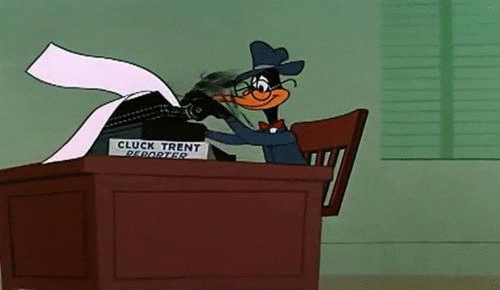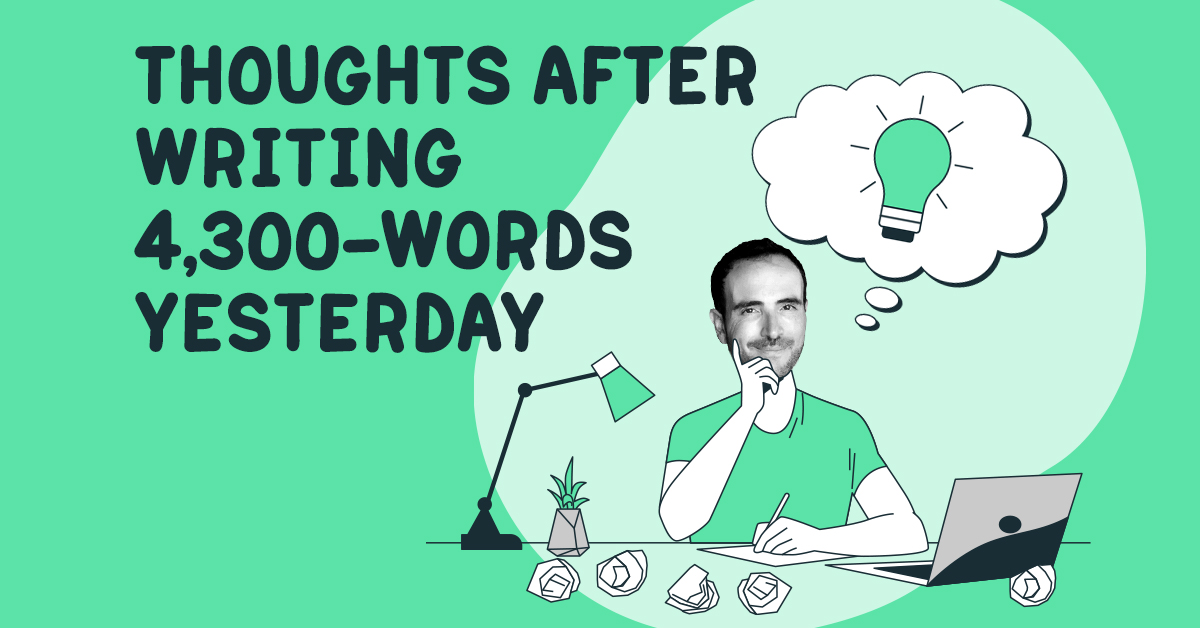I spent almost the entire day a good while ago writing an essay for my Substack.✍️
It’s about how science is becoming more authoritarian and how this trend is reflective of society at large.
 It ended up being long, at over 4,300 words, and it’s fairly dense.
It ended up being long, at over 4,300 words, and it’s fairly dense.
It’s also one of my favorite things I’ve ever written…🤩
So I want to talk about writing that essay and share some thoughts on the art and process of writing in general.
First, let’s talk about intention.
The essay was written for more of an “intellectual” audience. By that, I don’t necessarily mean college graduates or those with advanced degrees. But I do mean, those who have the mental fortitude to work through a 4,300-word essay that explores philosophical, moral, political, and sociological concepts.
I set out with this intention when writing the essay, and that matters:
You need to know your audience and your goal before you start writing, as those things will shape the form your work takes.🎯
Instead of an essay format, I could have written a 4,300 word “sales letter” that made the same arguments – and it would have looked entirely different. It would have been much less dense, and it would have appealed a lot more to emotion. It would have been written to a 6th-grade reading level.
So why didn’t I do that for my essay? By making it simpler and more emotional, wouldn’t I have been able to reach more people?
The answer is “probably.”🤔
But the reason I didn’t goes back to intention.
I wrote that essay for me and not for anyone else.
It’s that simple.
Now let me be clear:
 That’s not to say I don’t want others to read what I wrote.
That’s not to say I don’t want others to read what I wrote.
Of course I do.
Just like any writer, I want people to love my words, to spread them far-and-wide, and to shower me in validation and adulation as they're doing it.✅
Just like any writer, I want some people to hate my words too, to viscerally react to them. To find my work jarring or polarizing.
Just like any writer, I want my words to bring something to life inside the reader. To challenge them, nurture them, or maybe even destroy them.
And yet, simultaneously, I’m also detached from that outcome.
I understand that there’s a good chance that, for most of the people who read my essay, that won’t happen and/or didn’t happen. And I know the only way for me to stay sane is to accept that reality.
This is especially true since, as stated, I didn’t write that essay for others. I wrote it for me. And regardless of the reception I get from others, I loved the writing process. That day of writing was one of the best days of “work” I’d had in years.👌
So with that being said, let’s look at that process:
I started working on the essay in the morning. The first 4-5 hours were spent doing research and then finding a way to mold that research into a cohesive narrative. This part was very similar to the process of writing a sales letter: I had general ideas of the argument I wanted to make (science is becoming more authoritarian, it reflects a wider societal trend), and then I began digging through resources to support my argument.
During that research process, I read studies on authoritarianism, documents from various medical associations, news stories and data from polling services, and more. I also drew from my recollection of articles I’d viewed in the past and the books I’ve read.
Then, once I had all that research put onto a word document…
I started sorting through it and trying to create an “outline” of what my essay would look like.
 This took some time, because I’d uncovered various powerful ideas that were related, but not identical, and they needed to be presented in the right order so as not to break the chain of logic.
This took some time, because I’d uncovered various powerful ideas that were related, but not identical, and they needed to be presented in the right order so as not to break the chain of logic.
It was like putting together the pieces of a puzzle, stimulating but also challenging. Ultimately though, there was no way around this. I knew the outline was integral and that I wouldn’t write effectively without one. And I was correct.
Plus, during the outline process, two crucial things happened:
- Several “sub-arguments” emerged that made my essay stronger…
- I realized some pieces of my research were compelling but unessential, and I had to cut them.
Both those things have parallels to copywriting.
You’ll find interesting sub-arguments about the efficacy of the product, or additional arguments that prove your unique mechanism as you’re preparing to write the sales copy. Then you’ll need to decide which of those things to put in, and which ones to omit. The goal is to convince the reader without overwhelming or overloading them.
Okay, and then after all that research and outlining, it was time to write.
Putting down the 4,300 words to paper took me about 2.5 hours. This part was relatively easy because I already had my outline. And there’s an obvious comparison here to writing long-form sales copy and using a process like my RMBC Method: if you already have a plan and an outline, it makes writing SO MUCH faster and more efficient.
To put that another way:
The most important work a copywriter does happens before they sit down to write the actual copy.
This seems obvious, yet so many copywriters want to skip the groundwork and it’s always a mistake: You can’t reap the harvest unless you plant the seeds first.
 You should also know that throughout the whole process of writing the essay, I ignored everything else.
You should also know that throughout the whole process of writing the essay, I ignored everything else.
I didn’t look at my email or check social media or give my phone more than a glance for over seven hours.
While I did miss some stuff that day, my world didn’t catch on fire.
I had some messages to respond to, but there were no catastrophes. Everything was still standing. And I know that if I had been checking my email, Slack, Facebook, Instagram, news websites, or anything else – there is ZERO chance I would have written a 4,300 word essay and been able to publish it in under 8 hours.
Okay, second to last – I want to share that after I published that essay, I quickly noted there were numerous typos.
I knew I could continue to go back and edit the piece, of course, and I have. The reason I share this is because, while I do want to get to a point where my writing is proofread before I put it into the public domain, right now that’s not feasible. And I don’t let this reality hold me back. If I worried about those typos, my volume and productivity would be much lower. I’d rather get ideas into the world and then refine them as I go.💡
Alright and lastly, I want to talk about passion.
Again, I don’t know if the essay I wrote is even objectively “good” or not. I’m not sure if many people will read it or have read it. There’s a decent chance it just faded into oblivion. At least, it faded for others.
For me though, that essay will impact me forever. I’ll always be proud of myself for writing it. And I’ll always have a crystal-clear marker that documents who I was and what I thought on that date, November 10th of 2021.
By “marker,” I mean that that essay is something I can refer back to 5 years, 15 years, or even 50 years from now. Something that will provide a snapshot of what was going on inside my brain.
That’s the incredible thing about writing – you’re creating a time capsule for yourself. Something that can be dug up at your leisure, and that captures who you were, what you felt, and the things you believed at a given moment in time.
This is true of a nonfiction essay, but it’s also true of your sales copy, too.
I can look back at various sales letters I’ve written over the years, and it’s like listening to a song you used to love but haven’t heard in a while. Not only do you enjoy the rhythm and the melody, but you’re flooded with memories too. You remember who you were with, where you were living, what you were worried about, what your dreams were, and all the other contexts of your life in that moment in time.
You are transported.
That’s incredible, and it’s one of the many reasons why I love to write.
– SPG
P.S. This post originally came from an email I sent to my private list. If you want to see more stuff like this from me, you can apply to join my list using this link

0 Comments